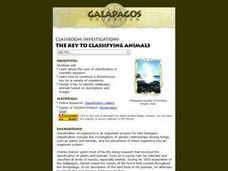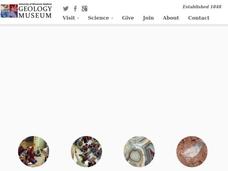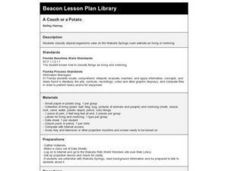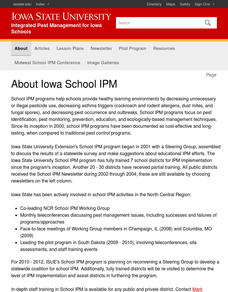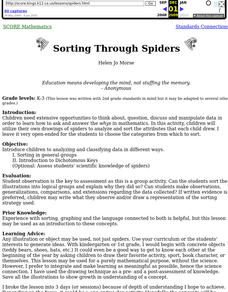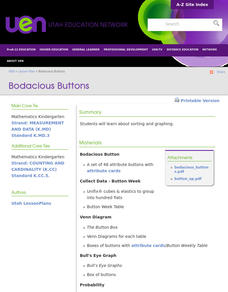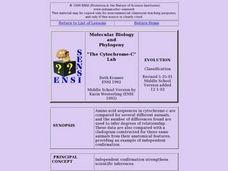Curated OER
Summer: Getting the Bugs Out
Students compare and contrast classification systems used throughout the world. They also examine the importance of preserving biological diversity.
Alabama Learning Exchange
Endangered Species: What Are They And How Can We Help Them?
Students research endangered species online and prepare a presentation identifying species, and the reasons why species are becoming endangered,
Curated OER
The Key To Classifying Animals
Explorers of the environment construct a dichotomous key for a variety of organisms and design a key to classify Galapagos animals based on descriptions and images. The lesson includes a link to an animal gallery and the worksheet for...
Curated OER
A Phylogenetic Perspective for the Cladistically Challenged
High schoolers observe the structures of skulls as presented in drawings, and determine which are most closely related to the skull of the mosasaur.
Curated OER
PRIMARY AND SECONDARY SUCCESSION IN AMERICA'S FORESTS
Students examine forest organisms, features of some of the different types of forest, classify organisms based on the type of forest they come from, and explore how certain species are connected with other, particular species within...
Curated OER
What Is in a Rock?
Students identify, sort, and classify mineral samples that make up a common rock.
Curated OER
A Couch or a Potato
Learners classify objects and organisms seen on the Wakulla Springs icam website as living or nonliving.
Curated OER
Life And Death
Students participate in an interactive game to review how living things are classified.
Curated OER
Introduction to Classification
Fourth graders design a classification system to categorize animate and inanimate objects. They discuss the advantages of grouping things as they classify buttons, leaves, shells.
Curated OER
PESTICIDES AS CHEMICAL TOOLS IN IPM
Tenth graders explore the importance of pesticides as chemical tools. The chemistry of a pesticide is important for understanding the composition of the product, the classification of pesticides according to their use and the...
Curated OER
Cardboard Tree and Endangered Animals Lesson
Students create endangered animal figures and their habitats.
Curated OER
Sorting Through Spiders
Students utilize their own drawings of spiders to analyze and sort the attributes that each student drew.
Curated OER
Mineral Magic
Students classify rocks and minerals according to their characteristics, after finding the similarities and differences of school supplies and pasta.
Curated OER
Bodacious Buttons
First graders participate in games, graphing, and probability exercises to sort and graph buttons. They sort buttons with Venn diagrams and Bull's Eye graphs.
Curated OER
The Cytochrome-C Lab
Learners examine a method biologists use to try to determine relationships. They examine how amino acid sequences have been determined for a number of proteins, and how scientists can make inferences about DNA based on the amino acid...
Curated OER
People Are Like Peas in a Pod
Students experiment with pea pods to observe/appreciate the diversity of individuals within a population, and to explain of how dominant and recessive traits, genotypes, and phenotypes help produce variation in a population.
Curated OER
Hunting Invertebrate Fossils in the Classroom
Students acquire a general knowledge of fossils and paleontology, the study of evidence of life in the past and identify the major invertebrate groups (phyla) commonly found in the fossil record.
Curated OER
Investigating Evolutionary Questions: Bats, Whales, Reptiles, Birds, Animal Classification
Students are guided through a process in which three questions are addressed by retrieving beta hemoglobin sequences from online databases, and using online tools to compare those sequences in student-selected animals.
Curated OER
Animals, Animals, Everywhere
Fourth graders participate in a variety of activities dealing with animal characteristics and classifications in this multi-task lesson. They use graphic organizers, make booklets, and make models.
Curated OER
Minerals of the Earth
Young scholars learn and practice identifying Earth's minerals and their properties. Working in small groups, they evaluate minerals. This is a well-described lesson, which students enjoy.
Curated OER
Scavenger Hunt: A Group Collection
Learners be complete a collection of living organisms and systems from the school campus.
Curated OER
In a Class of Their Own
Students explore taxonomy and how birds are classified in this scientific system. They use this knowledge to create entries for a field guide to birds that can be used to identify different species.
Curated OER
Pair the Plants: An Introduction to Scientific Names
Students examine why plants have both common and scientific names, then complete the activity by matching each common plant name with its scientific name. They finish by working in cooperative groups to create an ABC of Plants class book.
Curated OER
The Designed World
Learners study the classification system used in a library. In this sorting and classification lesson, students visit their library and define the classification system in place. Learners discuss the sorting method and then come up with...




